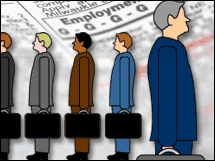NEW YORK (CNN/Money) -
In the market for a new job, but concerned that your gray hair will work against you? You may have less to worry about than you think.

"More and more companies recognize the traditional skills that older workers bring to the table," said Renee Ward, founder of seniors4hire, a Web placement organization specializing in the plus 50 set. "Older workers are intelligent, experienced, flexible, and they have the soft skills needed to blend in well at a new company."
But most of all, older workers are reliable. Ward said that many companies tell her they have trouble with young hirees "coming in with bad attitudes."
Retailers, restaurants, and business-service companies all say that they can't find enough qualified people. And, as the economy improves, the job squeeze will worsen.
(Click here for a list of the best employers for workers over 50 from the AARP.)
The numbers game
More older workers are in the labor force than ever. Since the first quarter of 2001 through the end of the second quarter of 2003, the number of Americans over 55 years old either working or looking for work has risen 2.8 percent, according to the Bureau of Labor Statistics.
During the same period, the number of young workers (16- to 24-years old) fell by 3 percent.
But as the oldest of the 76 million baby boomers (80 million counting immigrants) near retirement age, employers face a mass exodus of workers from the labor force.
The Department of Labor estimates that 26 million Americans will retire from the current 147 million person labor force by 2008 and 4.6 million jobs will go unfilled.
"Retirements will be a trickle the next few years but a tsunami after that," said Howard Muson, an economist with the Conference Board and author of a report entitled Valuing Experience: How to Retain and Motivate Mature Workers.
This will alter the way companies operate. Employers are just coming to realize, said Muson, "that they were allowing, even encouraging, important skills and expertise to walk out the door."
Muson said more than 80 percent of senior human resource executives who participated in an online survey had rehired retired workers, often in ad hoc jobs as consultants or private contractors. He cites three main reasons:
· To preserve the retirees' knowledge. Many a worker has built up valued skills over time. When that worker leaves there may be no one left with that know-how.
· To mentor younger workers. Companies often enlist retirees to pass their expertise on.
· To interact with old customers. Continuity is important to many customers. Many an older salesperson, for example, may understand customers' needs almost as well as they do.
Two steps forward, one step back
In spite of the progress, it cannot be reported that prejudice against older workers has disappeared.
During downsizings, said Deborah Russell, AARP's manager of economic security and work, companies often trim older, more expensive workers first. As a result, she said, "We're seeing a bit of an increase in age discrimination suits in the bad economy."
Some HR departments even use software that screens out more experienced applicants, according to Ward. "The candidates never know what happens. They just don't get a call back," she said.
But what is it about age that makes HR managers recoil? Some say older workers aren't in it for the long term, that just as they get settled, they leave.
Maximizing the advantage of experience
So how can a mature job-seeker improve his chances? Ward has several pieces of advice.
· Show only the last 10 years of your work experience on your rèsumé. De-emphasize dates in general, by listing duties, skills, and accomplishments, rather structuring it as a chronology of employment.
· During interviews, don't carry a chip on your shoulder. Don't expect rejection. Act engaged, enthusiastic, upbeat, and energetic.
· Try to customize your pitch to the company. Emphasize how your experience can help solve their unique problems or contribute to their success.
Remember that many companies may be looking for someone just like you.
"Employers are becoming more flexible," said Russell. That can mean adjustable schedules that give older workers the leisure or family time they need.
That often suits health-care companies, which can accommodate many part-time employees working flexible schedules. AARP's list of 25 of the best employers for workers over 50 includes 11 that specialize in health or elder care. "With the labor shortages facing that industry," said Russell, "they see the value of tapping the older work force."
In the past, companies created incentives to encourage older workers to move out and younger ones to move in. They wanted workers to retire to ensure a steady turnover and a workforce balanced by age.
Now, said Muson, "Companies will have to re-structure their incentives to meet the needs of older workers."

|

